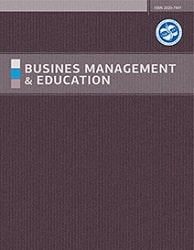THE CALLING OF EMPLOYEES AND WORK ENGAGEMENT: THE ROLE OF FLOURISHING AT WORK
THE CALLING OF EMPLOYEES AND WORK ENGAGEMENT: THE ROLE OF FLOURISHING AT WORK
Author(s): Humaira Erum, Ghulam Abid, Francoise ContrerasSubject(s): Business Economy / Management, Organizational Psychology, Human Resources in Economy
Published by: Vilnius Gediminas Technical University
Keywords: calling at work; work engagement; flourishing at work; work orientation; self determination theory; positive organizational outcomes;
Summary/Abstract: Purpose – Both the researchers and practitioners believe that engaged, energetic and focused employees provide sustainable competitive advantage to the organization. Therefore, the aim of this study was to explore whether the calling of the employees is related to work engagement and to observe if flourishing at work exerts a mediating role in this proposed relationship. Research Methodology – The time-lag method was followed to collect data from a sample of 101 employees working in different organizations from service industry. Findings – Results showed that calling is a critical psychological driver of work engagement explaining about 30% variance and it is valuable in shaping the employees orientation. Limitations – The data collection for the study was restricted to one major city so care must be taken in generalizing the results. Moreover, the use of cross sectional data may not completely capture the true nature of the psychological constructs like calling, flourishing and engagement. Implications – This study helps human resources managers to hire individuals who feel “called” to the job and devise training programs that shape their work orientation in order to engage and retain them. Originality – The current study considered work engagement as a psychological state and empirically tested psychological drivers- calling as the work orientation and flourishing. The proposed relationships, to the best of our knowledge, were not empirically tested previously.
Journal: Business, Management and Education
- Issue Year: 18/2020
- Issue No: 1
- Page Range: 14-32
- Page Count: 19
- Language: English

